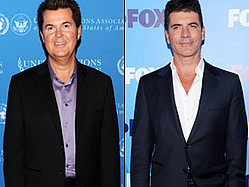In one of life's bizarre coincidences, the two men most instantly associated with the global phenomenon that is "American Idol" are both named Simon. Unfortunately, that's where their similarities end, as, once again, "Idol" creator Simon Fuller and breakout star Simon Cowell find themselves locked into a legal battle for control, credit and what is likely a massive pile of cash.
"It's this horrible fate for both of them that they're both incredibly ambitious people who very much like to and need to be the powers of their world, but their fate has been inextricably bound since they rose together on the strength of what was Simon Fuller's creation, 'American Idol,' " Richard Rushfield, author of "American Idol: The Untold Story," told.
And though Fuller was the brains behind launching "Idol" in England in 2001 (where it was called "Pop Idol"), the show quickly rose to immense popularity, thanks to the breakout stardom of then-little-known music executive Simon Cowell. "This fight has gone through several permutations, but because both have had a hand in the creation of ['Idol'], they have been locked in this combat over it."
That latest twist comes courtesy of a recent lawsuit Fuller filed in Los Angeles Superior Court in which he claimed that he had negotiated an executive-producer fee and producer credit on "X Factor" as part of a settlement in the 2004 copyright-infringement suit against Cowell when "X Factor" launched in the U.K.
Eager to have his own talent show, Cowell launched "X Factor" in the U.K. through his own production company, Syco, putting a twist on the singing-competition genre by adding a rotating cast of celebrity mentors. Cowell saw it as an eventual successor to "Pop Idol," which went on indefinite hiatus after its second season because of Cowell's eagerness to launch "Factor."
Fuller filed suit against Cowell, Syco and the producer of both shows, FremantleMedia, and a lengthy trial was avoided after the two sides came to an out-of-court settlement in 2005 that granted Fuller a "minority interest" in the show and kept Cowell on "American Idol" for five more years, as well as giving him a bigger stake in "Idol."
The deal also required Cowell to not launch "Factor" in the U.S. until 2011, at which point Fuller agreed to pull "Pop Idol" off the air in England.
According to The Hollywood Reporter, Fuller is now claiming that Fox and producer Fremantle North America — which produces both "Idol" and "Factor" — are refusing to honor that deal as they plan to unleash the heavily hyped "Factor" on American audiences in September.
"Fox and Fremantle made hundreds of millions of dollars thanks to the creative efforts of Fuller," the suit claims. "Now, when it is time to finally perform on these unequivocal promises, Fox and Fremantle refuse to provide Fuller his executive producer credit for Defendants' new television show, 'The X Factor,' and refuse to pay Fuller an executive producer fee 'commensurate with his duties and stature in the entertainment industry.' Defendants refusal to honor their promises made to Fuller is particularly malicious given that but for Fuller's agreement, the 'X Factor' show would not be able to broadcast in the United States at all."
The timing of the suit is curious, according to Shirley Halperin, music editor at The Reporter and founder of its Idol Worship blog. "I think that promo Cowell made where he was making fun of 'Idol' really stung and it propelled this action," she speculated. "It was obnoxious and it made Fox compulsory, since it had to approve the ad. The lawsuit came seven days after that."
She also noted that the suit does not name Cowell as a defendant, but does take aim at Fox and Fremantle. "They came up together and have had this symbiotic relationship for a long time, but over the years, their interests have diverged," she said, with Fuller taking on more management and TV production duties, while Cowell has mostly stayed the course as a TV presenter with the occasional foray into TV producer. "That's divided them over time."
But, curiously, Halperin said when she was compiling her book on the show, "American Idol: Celebrating 10 Years," she looked at the photo archive of every image taken of the two over the years, and even as recently as 2009, the pair looked "incredibly" friendly, even chummy, in the photos. "The relationship is a lot more complex than we know, and it's easy to say it's a love/hate thing, but I think there's a deep friendship and mutual respect, but at the same time they are very competitive and have become adversaries at times."
Rushfield said the battle comes down to "two tremendous personalities" who are used to controlling things at a very high level. " 'Idol' is probably the most valuable entertainment franchise in the world now that 'Harry Potter' is gone," he said. "The stakes are in the billions of dollars ... and [based on] a relationship that came together very quickly and that they're locked into. If they could do it over, I'm sure they would all give themselves a bigger piece."
Fox and Fremantle responded to the suit with a comment to The Reporter, in which they said, "Mr. Fuller has not been hired, nor performed any duties, on the U.S. version of 'The X Factor.' His suit seeks payment and credit as an executive producer despite his neither having been approved by the required parties, nor hired, as such. We believe this lawsuit is without merit, and we expect to prevail." Fuller's attorneys threw water on that claim, saying Fox was "contractually obligated" to approve Fuller as an executive producer on the show and that it has breached that obligation.
"They both want the honor and the credit," Halperin said. "Fuller has always had the credit and no one is taking that away, but Cowell wants more than just to be the guy that judges. He wants people to look at him as a real force."
Get your "Idol" fix on MTV News' "American Idol" page, where you'll find all the latest news, interviews and opinions.










